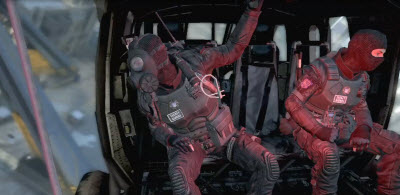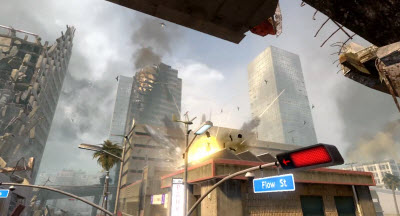 GamesBeat: It seems like this new timeline allows you to create cool new weapons. With the 1960s or 1970s, you were limited to the technology of the time. That’s why you couldn’t use drones in the first game, right?
GamesBeat: It seems like this new timeline allows you to create cool new weapons. With the 1960s or 1970s, you were limited to the technology of the time. That’s why you couldn’t use drones in the first game, right?
Lamia: They are black ops. So they did have some pretty different kinds of weapons that nobody during those days would have heard about. They did have technology and advancements. But we didn’t have any real drones. We did have a TV-guided missile in Black Ops in both campaign and the multiplayer. We did have a radio-controlled (RC) car. It is fictional, and the fiction is that these guys have access to technology that other people don’t and that people may not even know about. We never tried to push it into drones in the past, if you know what I mean, but with that kind of setup and fiction, that’s what we’re using this future fiction for.
GamesBeat: I guess the advantage of going into the future is that you’re free to use anything, right? You can create all these brand-new weapons. That seems to be what the fan base really loves, right? If you went back to 1900 or so, they’d lose their submachine guns, and they’d be very unhappy about that.
Lamia: What it has done is it has allowed us, inside of a plausible fiction, to set up certain kinds of technologies. But we don’t do just anything. Every single weapon that we created, the team has thought about and thought about if it were plausible to have the technology for that weapon or that attachment given the coming decade or beyond a decade.
The goal for us was to come up with new and fresh gameplay that people hadn’t yet had an opportunity to experience. And so, going to a time frame helps with that, especially since we wanted to have it rooted in fact. I guess that is really the challenge, right? The future hasn’t happened. Making new gameplay and things that people haven’t seen in a period in history which hasn’t happened yet — that’s the challenge. But that’s also the fun of it.
GamesBeat: It sounds like there’s just an enormous amount of free thinking here. Were there any limitations you felt on what you should or could do given that this is part of a series as well — that this is not the last game you’re going to make?
Lamia: I have no idea, to be honest with you. We’re focused on just making Black Ops II. We haven’t thought about what comes after it. Have there been any limitations? No. I think it was just the boundaries we gave ourselves. We gave ourselves some guidelines. It was plausible reality. We wanted it to feel grounded, and so in order to create that fiction, you impose your own.
But it’s a very gray area. What’s plausible to one person and to another person might be two totally different things. But there’s usually a pretty good argument presented internally here when we’re coming up with our stuff. We’ve iterated on things — things that we’ve tried have not felt right, and we’ve had to iterate on that. Getting that future fiction right has been a challenge.
 GamesBeat: Was any of it driven by the fans and the reaction to the first game? Sometimes people will remove things that wind up being unpopular for some reason or bring back things that everybody wants.
GamesBeat: Was any of it driven by the fans and the reaction to the first game? Sometimes people will remove things that wind up being unpopular for some reason or bring back things that everybody wants.
Lamia: We think the fans enjoyed the fiction of Black Ops and the characters that we introduced. I think that helped influence Dave’s decision to want to have them as part of this narrative fiction that he wanted to create with Black Ops II. You listen to your community and your fan base after you release a game, particularly your online community. They’re playing the game for many, many hours, a lot of them. There’s a lot of feedback that comes in, and we do try to pay attention to that.
But often times, what they’ll identify as their desires — you have to dig deeper to think about, well, what are they really saying here? Zombies is also very interactive with its fan base in terms of seeing what excites them and things like that. We’re definitely making the game that we want to make, but we’re also paying attention to the community. They’ve been very good to us. They’ve played a lot of Call of Duty games, and they’re interested in things we haven’t done yet. So I’m sure it’s have some influence on the team.
But what I like about Black Ops II is you’ll find that many people aren’t expecting us to have branched out and done everything from the fiction to the new gameplay that we’ve shown you here today. I think that’s going to be exciting and new for them.
 GamesBeat: Are you running out of major cities to visit and destroy?
GamesBeat: Are you running out of major cities to visit and destroy?
Lamia: Naaah, there’s plenty of places to go.
GamesBeat: Set it in Antarctica or something.
Lamia: We’ve actually gone there in Black Ops I, during the…the post in the Reznov mission — that’s right. When you first discovered the Nova gas. So we’ve even been to Antarctica.
We do like to do a variety of locations. I think that’s exciting for people; it’s exciting for our artists to be able to work with new environments. I’m sure you saw some of the art on the walls. There’s a lot of different kinds of environments and architecture. I think that’s pretty stimulating to the creative guys here, to be able to work on different locations — different sorts of things — whether it’s architecture or organic materials or whatever.
GamesBeat: Is there anything that would be consistent between what you do and what Infinity Ward does? Is there some understanding there that if it’s got the Call of Duty name on it, it’s going to have these certain characteristics?
Lamia: We do share some values that are similar. I think the desire to make sure, particularly, that the multiplayer game runs at 60 frames per second and is fast-paced and precise. The cinematic nature of the game, I think, is sort of signature for the series. For every game that we’ve made, or Infinity Ward or some of the other developers have made, that’s an important aspect of it.
